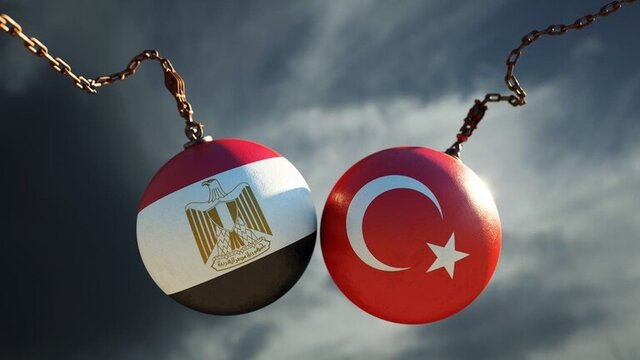But the current government of Ankara seeks to improve relations with Damascus and tries to restore and develop its relations with Riyadh and Cairo. Although the restoration of Turkey’s relations with some countries has been fruitful, it is followed by many uncertainties in the case of Egypt.
All the normalization steps of Turkey go back to the past two years. Turkey’s strategic foreign policy in the region has been accompanied by many ups and downs. The Turkish government’s approach to popular uprisings known as the “Arab Spring” was also the turning point of that policy. Before the Arab Spring, Turkey’s politics followed the plan set by Mustafa Kemal Atatürk in 1930.
This framework was summarized in three key areas:
– Maintain and strengthen your historical and cultural relations with the countries of the Middle East.
– Do not interfere in the internal affairs of those countries.
– Improve your relations with Western countries, but do not become their toy for their imperialist goals.
Turkey followed this framework for 75 years until the beginning of the “Arab Spring”, but after that, due to the position of the Justice and Development Party concerning the Muslim Brotherhood and the support for Mohamed Morsi, the fifth president of Egypt, there were changes in that traditional policy.
Turkey’s relations with the UAE, Saudi Arabia and Egypt also faced problems with Turkey’s rotations. As such that Sameh Shoukry, the Egyptian Foreign Minister, said in a speech that they will make a decision based upon Turkey’s deeds, not on what it says’; this means that Egypt wants to know whether Turkey’s steps promise stability in politics or not.
After Egypt and Greece last month rejected an agreement signed by Libya’s Unity Government with Turkey for oil and gas exploration in the Mediterranean Sea, a new round of mistrust emerged between the two sides, with each one accusing the other of straining relations.
Another point is that Libyan oil, due to the existence of internal conflicts between the forces of General Khalifa Haftar (the Tobruk parliament in eastern Libya and supported by the governments of France, Russia, the US, Saudi Arabia, the United Arab Emirates and Egypt) and forces of the National Unity Government (the government based in western Libya and recognized in the United Nations) is particularly coveted by Turkey, Greece, and Egypt. The Turkish government reached a joint agreement with the Libyan Government of National Accord regarding demarcation of maritime lines which, of course, faced serious opposition from Egypt and Greece.
Despite the fact that General Haftar’s forces achieved significant victories against the forces of the National Accord Government and controlled more than 50 percent of Libya’s territory (control over 90 percent of Libya’s oil resources and facilities), but Tripoli is under the control of the opposite group and the oil fields around this city (Libyan offshore oil and gas fields on the northwest coast of Tripoli) are of great importance.
This agreement and demarcation of maritime lines has led to many regional and extra-regional sensitivities. With this agreement, Ankara can make the most of the huge oil resources in that area. Turkey has pledged to provide full support to the government against General Haftar’s forces.
Greece has also taken a tough stance against Turkey. From the point of view of Athens, Turkey tried to create a legal monster with the 2019 memorandum by blackmailing and putting pressure on players in Libya. According to international laws, that memorandum is illegal and invalid. The memorandum violates the principles of UN maritime law. Provisional governments cannot sign international agreements. The term of the Libyan government has ended. Such agreements have not been approved by the Libyan parliament either.
Although Turkey accepts that Ankara and Cairo have differences regarding Libya, this does not mean the termination of all bilateral relations. Ankara disclaims responsibility for the slowness of the process of normalizing relations with Egypt and asks Cairo to take concrete measures in this regard, because cooperation between the two countries will have a positive effect on the region. In terms of its recent maritime agreement with Libya, it is not against Egypt’s interests.
Turkey considers itself sincere for the normalization of relations with Egypt. But the Egyptians, criticizing Turkey, believe that the expired government in Tripoli has no authority to sign an international agreement. According to the Egyptian government, all foreign forces and soldiers should leave Libya. Cairo considers Turkey’s agreement with Libya illegal and accuses Ankara of looting oil resources in the sea and demarcation of maritime boundaries for its own benefit.
Negotiations for the normalization of relations between Egypt and Turkey have been stopped due to lack of change in Ankara’s policy. Because there has been no change in Ankara’s procedure for military withdrawal from Libya. According to the leaders of Egypt, one of the worrisome issues is the failure of foreign forces to withdraw from Libya and the failure to take decisive measures to achieve this goal.
Ankara took positive steps to normalize relations with Arab countries such as Saudi Arabia, Egypt, and the United Arab Emirates to thwart efforts to isolate Turkey in the Eastern Mediterranean. Although in the process of normalization with Egypt, it has not achieved a very positive result.










0 Comments